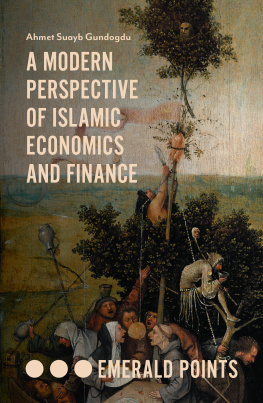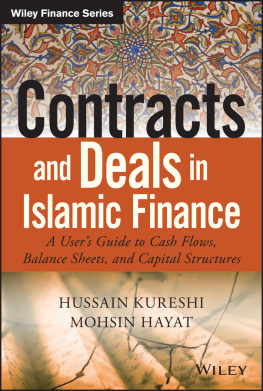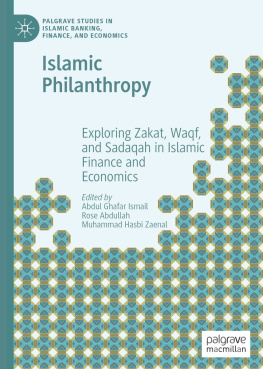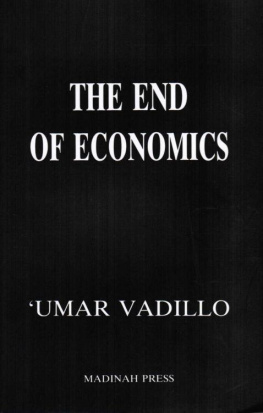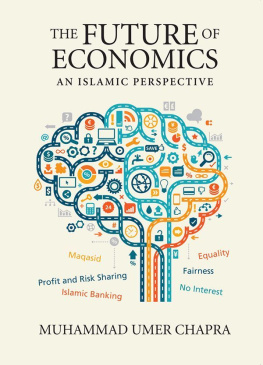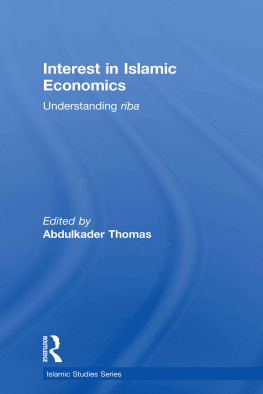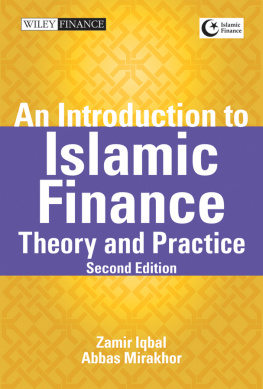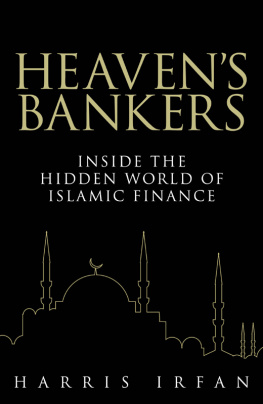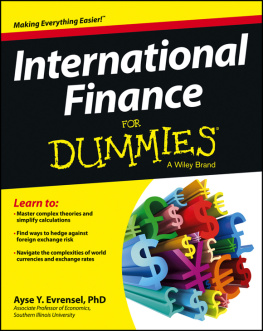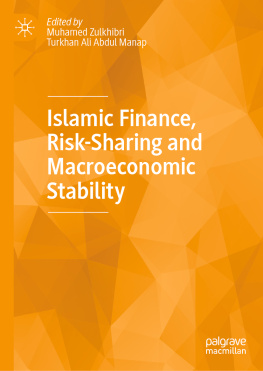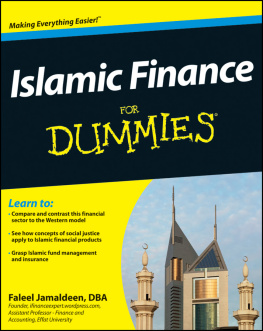PREFACE
LIZARD HOLE
Contemporary works on the theory of Islamic economics and finance emerged out of a sense of urgency in order to address the significant changes in the Muslim world after the independence of nations from Southeast Asia to West Africa in the twentieth century. Educated Muslims realized that simply obtaining independence had not been provided the expected freedom or solved the protracted problems of Muslim communities. They referred to the glorious days of Islam and hastily praised the ideas of classical Muslim thinkers such as Ibni Khaldun and Ghazali. However, this approach to establish an identity based on the asabiyyah concept of Ibni Khaldun or the use of standardized religion as an instrument to consolidate society, as proposed by Ghazali, had an opposite effect and caused Muslim societies to crumble further. Indeed, reference to the ideas of the classical thinkers was not the solution to the Muslim worlds contemporary problems but was perhaps the deep-rooted reason for the Muslim worlds decline. The Messenger of Allah said, as narrated in Abu Dawud:
He is not one of us who calls for Asabiyyah, or who fights for Asabiyyah or who dies for Asabiyyah.
Once, I received an email forwarded from an educated man because he was happy to see a citation of Ibni Khaldun by a New York Times columnist. It is strange to observe such veneration regardless of the clear messages in the hadith and Quran against asabiyyah. Asabiyyah is the concept of group unity in pursuit of success in a competitive environment where, as Charles Darwin claimed, the survival of the fittest is detrimental. Asabiyyah can appear in ethnic, sectarian, religious, or geographic forms. Islam as a religion is a set of principles advised by the Almighty as a means for the salvation of humanity. The divine knowledge we received through the messengers of Allah indicates a life for the unity of humanity and harmony with nature. In order to achieve this unity and harmony, Islam prescribes strict to-do and not-to-do lists, unlike asabiyyah, which tolerates any act for the well-being of the group. Unfortunately, contemporary Muslim leaders and intellectuals chose the asabiyyah concept of Ibni Khaldun over the divine message delivered by Muhammad (PBUH). The result has been the growth of Islamic groups or Islamic political movements that have ultimately become either violent or have subverted Islam. The same mental fixation was reflected in economics and finance. Contemporary economic and financial systems in the Muslim world appear to replicate those in Western countries, except that they wear a turban. Muslims inadvisably try to grapple with the Western world through asabiyyah-based courses; moreover, while doing so, they converge on the Western world because they use the same instruments for so-called defense and the internalization of wrongdoing.
It is unsurprising to observe such trends whereby Muslims, bit-by-bit, internalize the Western worlds philosophy, and economic and financial system, while defying the West. The messenger of Allah said:
You will certainly follow the ways of those who came before you hand span by hand span, cubit by cubit, to the extent that if they entered the hole of a lizard, you will enter it too. We said: O Messenger of Allah, (do you mean) the Jews and the Christians? He said: Who else?
Humans, whether Muslim or non-Muslim, do not deserve to enter a lizard hole. We live in a world where all countries implement the same economic and financial system and try to blame the problems caused by this flawed system to other groups inside or outside their countries. Islam recognizes traditional world religions, yet claims to be a higher version of the latest divine religion of the Almighty. Among other issues, it provides a blueprint for a healthy economic and financial system that is greatly needed to sustain unity and harmony among humans. The Almighty creates humans and wishes us to be happy and in love, with no hatred and no envy of others. Unfortunately, no matter how spiritual a person is, this approach to life is lost in the wrong economic and financial environment. Moreover, such an environment is exactly what is present today in the world. It is the mandate of Islamic economics and finance as a discipline to explore a novel system in the context of the contemporary world. However, the bulk of intellectual work on Islamic economics and finance adopts Western theories and inserts Islamic in front. Can we claim that the capital asset pricing model (CAPM) makes sense? If it does not make sense, why should Islamic CAPM do so? This approach also fundamentally contradicts the philosophy of Islam. Islam does not propose any kind of theory; instead, it has to-do and not-to-do lists. From these lists, we can design a blueprint of a sustainable economic and financial system because it is the wish of the Almighty to see humans employing their intellects to solve problems. Thus, this books purpose is to search for a blueprint and provide the to-do and not-to-do lists in the context of contemporary world issues.
Part I: The Ship of Fools
MAQASID AL-SHARIAH
If there are any who scorn writing,
Or any who could not read it,
They will clearly see their own nature in the images
And in these will see who he is,
Whomsoever he might be, will see what he lacks.
I call this the fools mirror,
In which every fool can see himself;
Who each is will be made known to he
Who looks in the fools mirror.
Whoever reflects properly will soon learn
That he should not consider himself wise,
Should not believe of himself what is not the case,
For there is no-one alive who is not deficient,

